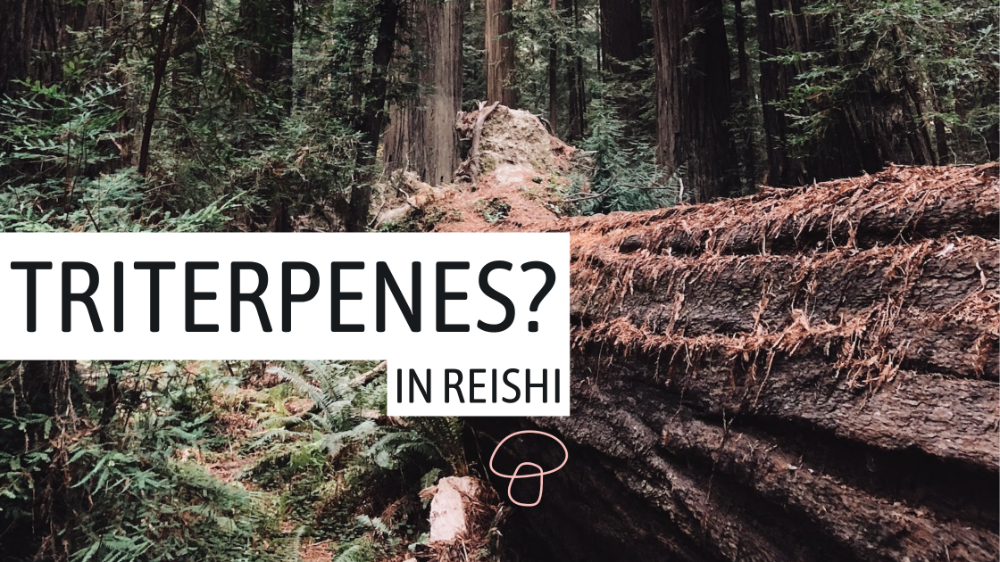
Triterpenes? Come on then, let's get geeky with Reishi and Triterpenes - some of the most desirable compounds gifted to us from this ancient and highly respected mushroom.
Anti-inflammatory & Antimicrobial: Triterpenes combat inflammation and microbial threats.
Cytotoxicity (a good thing): They display cytotoxicity against cancer cells.
Immune Support: Triterpenes can enhance the immune system.
Radio-protection: Protect against radiation-induced damage, which is key in the modern world. Not just in the context of therapies though also daily life where we can be on a train or bus or office with constant exposure to radiation fro phones, computers etc.
Nervous System Support: Improve sleep, focus, and emotional balance - yes please.
Hormone Balance: Triterpenes support a healthy hormone balance.
Digestive Aid: Support digestion.
Circulatory Health: Improve blood circulation.
A little deeper into Triterpenes...
Triterpenes play a balancing role in hormone regulation, digestion, blood pressure, and circulation. Furthermore, they are recognised as some of nature's most potent anti-inflammatory and antiviral agents.
Such hot topics - anti-viral, anti-inflammatory, digestion... It seems like many people are working on one of the above.
Reishi boasts numerous triterpenes, with the most prominent ones being ganoderic acids, lucidenic acids, and sterols.
Over the past few decades, more than 140 triterpenes have been identified in reishi across its fruiting bodies, spores, and mycelia. These compounds collectively fortify the immune system and offer robust protection - great for seasonal changes where the weather and external environment is in a state of change.
Triterpenes and Their Influence on the Nervous System
Interestingly, there exists a profound connection between the liver and the nervous system.
The soothing and grounding effects of reishi mushroom can be attributed to the liver-nourishing properties of triterpenes, which are closely linked to their distinct bitter taste. In Traditional Chinese Medicine, the bitter flavor is known to nourish the liver, promoting a grounding effect on the nervous system.
Like with Chaga mushroom, research has demonstrated that reishi triterpenes exhibit DNA-protective qualities against radiation-induced damage, even at low doses, signifying their potential in radio-protection and therapeutics.
Whenever I read DNA-protective and radio-protective it peaks my interest because of our increasing exposure to radiation. Chaga and Reishi both fall into this category.
Triterpenes cytotoxicity against cancer and tumor cells has been studied and documented, I'd love to share much more on this though it's important to be careful when exploring this topic. This cytotoxicity + radio protective are two very interesting avenues to explore with these mushrooms, for reasons I hope are obvious?
Interestingly, triterpenes serve as precursors to sterols, which are renowned for their natural anti-inflammatory properties. Triterpenes may offer a safe, effective, and natural alternative to conventionally prescribed anti-inflammatory medications - speak with your doctor about this before trying.
Triterpenes in two scentences?
Triterpenes have been observed to positively impact various aspects of health, including liver function, sleep quality, mental focus, brain function, immune system strength, nervous system balance, digestion, and circulatory health. They also exhibit potent anti-inflammatory, antiviral, antimicrobial, radio-protective, anti-cancer, and anti-tumor properties.
Yes please.
Studies and references:
1) Anti-inflammatory and anti-tumor properties of Ganoderma lucidum polysaccharides in vitro and in vivo.
Findings: This study explores the anti-inflammatory and anti-tumor effects of Ganoderma lucidum (reishi) polysaccharides, which are a type of triterpene, both in vitro (in a laboratory setting) and in vivo (in living organisms).
Radioprotective Effects:
2) Radioprotective effect of Ganoderma (Lingzhi) against radiation-induced DNA damage in human peripheral blood lymphocytes.
Findings: This study investigates the radioprotective properties of Ganoderma (reishi) against radiation-induced DNA damage in human peripheral blood lymphocytes, highlighting the potential radio-protective effects of triterpenes present in reishi.
3) Anti-inflammatory and anti-tumor-promoting effects of triterpene acids and sterols from the fungus Ganoderma lucidum
http://www.ncbi.nlm.nih.gov/pubmed/17311233
4) Ganoderma lucidum total triterpenes prevent radiation-induced DNA damage and apoptosis in splenic lymphocytes in vitro
http://www.ncbi.nlm.nih.gov/pubmed/21944902
4) Extract of Ganoderma lucidum prolongs sleep time in rats
http://www.ncbi.nlm.nih.gov/pubmed/22207209
